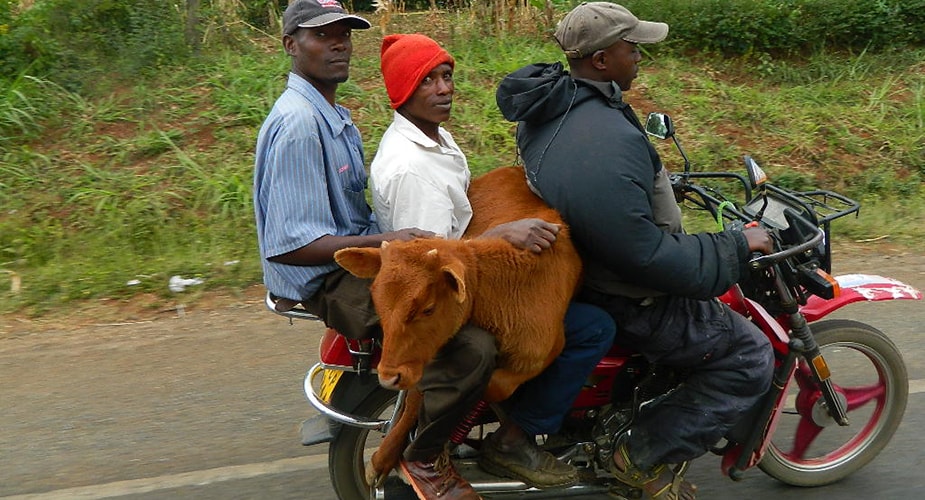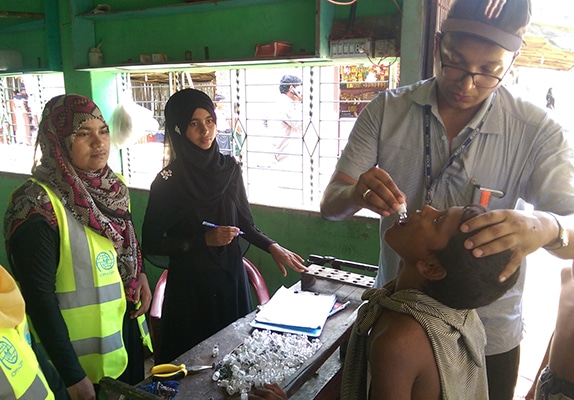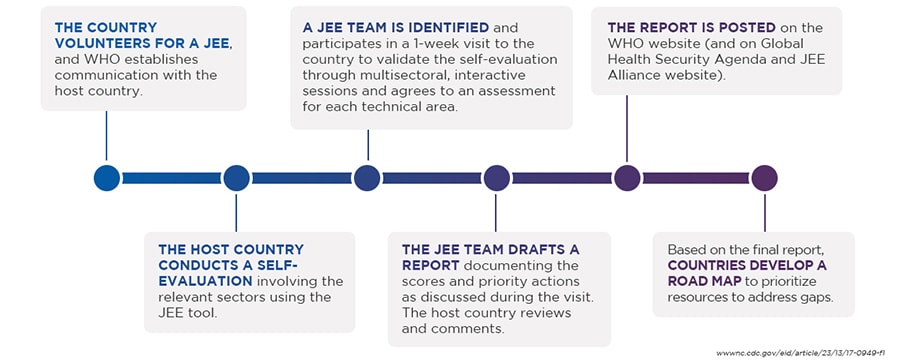The Joint External Evaluation (JEE) Process: A Project to Assess and Build Global Health Security
July 8, 2019

As the world becomes more interconnected, public health threats abroad, including diseases like SARS, MERS, Ebola and influenza, can have a greater impact on Americans at home. The epidemics of the last two decades have made it clear that we need to do more to ensure countries have the capacity to prevent, detect, and rapidly respond to public health emergencies to protect not just Americans, but people across the world. “Managing infectious disease outbreaks benefits from a collaborative approach. Working together to prepare for outbreaks before they occur means smaller or less outbreaks, money saved—and most importantly—lives protected from these threats,” says Michael Mahar PhD, lead for the Global Health Security Agenda Team for the Division of Global Health Protection at CDC.
To establish and maintain global health security, all countries are encouraged to take a multisectoral, “One Health” approach to comply with the World Health Organization’s International Health Regulations (IHR) (2005). A key component of the IHR’s monitoring and evaluation framework has been the voluntary Joint External Evaluation (JEE). In just over three years, 100 countries have voluntarily completed a JEE—representing over half of all UN Member States. CDC has supported this work by committing technical expertise to over 60% of the JEEs conducted thus far.
Assessing capacities to prioritize actions

Dr. Mostafa Moin Uddin, IMPACT-Bangladesh graduate, delivering oral cholera vaccine to a Rohingya child in the Cox Bazar refugee camp helps to prevent the spread of this dangerous disease. Photo: Dr. Nurullah Awal, IMPACT-Bangladesh
As an independent, transparent, objective, and multisectoral assessment, the JEE process enables countries to determine their ability to be prepared for and address infectious disease risks through a coordinated response. The JEE is not an audit of a country’s abilities, but is instead a collaborative effort between the country’s own experts and the external evaluation team. The JEE examines capacities across 19 technical areas to establish a baseline assessment, enabling countries to have a greater understanding of their gaps and weaknesses in health security, so they can focus efforts to improve in these areas.
“In this age of widespread international travel and commerce, an infectious disease can spread across the globe as fast as a 757-jet can fly—in as little as 8-36 hours—long before symptoms even begin,” says Kashef Ijaz, MD, MPH, Principal Deputy Director for the Division of Global Health Protection at CDC. HHS and CDC conducted a JEE in May 2016 to assess these risks within the United States. However, protecting Americans from public health threats does not stop there—the United States has also developed a National Action Plan for Health Security (NAPHS) to determine and prioritize actions that will help us improve our own health security.
Encouraging cross-disciplinary engagement
The JEE’s unique multisectoral approach has been a strength since its inception. The evaluation does not just examine the human health structure in a country, but encourages collaboration among those responsible for human health, animal health and environmental health. The JEE facilitates, “Increased engagement and leadership at the political level, engagement of new sectors in health, accurate identification of system weaknesses, and prioritization of a One Health approach,” says Daniel Stowell, Global Health Security Specialist at CDC. Dan has been working directly with Uganda to assist the Ministry of Health with developing plans and implementation of post-JEE activities. Partner engagement has been critical to his work in Uganda and this collaboration has enabled several improvements in their health security capacity over the last year.
As the former CDC JEE Team Lead, who has served as an external expert on four JEEs, Elizabeth Bell, MPH, was responsible for coordinating the implementation and scale up of the JEE process in partnership with WHO. “The cross-disciplinary engagement has been exciting to watch,” says Ms. Bell. “The JEEs are the foundation to monitor, measure, and grow global health security, directly impacting the health and safety of Americans, at home and abroad.”
The Joint External Evaluation (JEE) Process

100 Countries and Counting
CDC will remain heavily engaged in the future, as many countries have yet to begin this process. Completing this assessment is just the first step to strengthening global health security. Post-JEE NAPHS planning and its implementation, as well as a second round of JEE assessments, is critical to continuing to build the momentum towards preventing, detecting, and responding to infectious disease risks. This evaluate-plan-implement cycle will allow countries to systematically determine how to most effectively make improvements in their national health security, which will in turn strengthen global health security for us all.